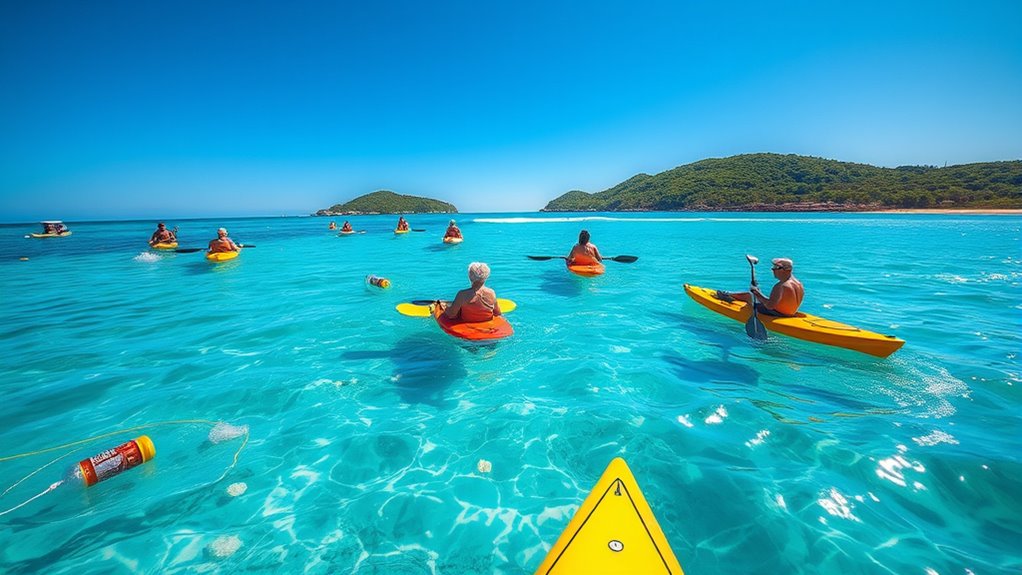As a floating visitor, you can help keep beaches clean by actively picking up trash you see and disposing of it properly. Carry a small bag or gloves to collect debris before it washes into the ocean, where it threatens marine life. Sign up for local cleanup events or simply encourage others to dispose of waste responsibly. If you want to learn more about how your actions protect ecosystems, keep exploring how collective efforts make a difference.
Key Takeaways
- Join local beach cleanup events to directly remove floating debris and prevent it from reaching the ocean.
- Properly dispose of trash and recycling to reduce pollution and prevent debris from spreading.
- Avoid littering and encourage others to do the same, promoting a cleaner beach environment.
- Educate yourself and others about marine debris impacts to foster responsible waste habits.
- Support organizations and initiatives that focus on marine conservation and beach preservation efforts.

Beach cleanups are an essential way to protect our coastlines from pollution and preserve their natural beauty. When you participate in these efforts, you’re directly helping to reduce marine debris that washes ashore, threatening marine life and diminishing the scenic value of beaches. Marine debris, which includes plastic bottles, fishing gear, and other waste, is a major hazard for wildlife and a sign of human impact. By joining volunteer efforts, you’re making a tangible difference, removing harmful trash before it can break down further and enter the ocean ecosystem.
Your involvement in beach cleanups not only clears debris but also raises awareness about the importance of reducing waste and recycling properly. As a volunteer, you become part of a community committed to environmental stewardship. This collective effort amplifies your impact, as more hands mean quicker, more efficient cleanup sessions. Plus, it’s an opportunity to learn about the sources of marine debris and how to prevent it, fostering a deeper appreciation for sustainable habits. The more people who volunteer, the better the chances of considerably decreasing the amount of trash that reaches our waters.
During a cleanup, you’ll find that marine debris often accumulates in specific areas, especially along shoreline hotspots. Your active efforts help prevent debris from drifting further into the ocean, where it can cause harm to marine animals like sea turtles, seabirds, and fish. Plastic waste is particularly dangerous because it can be mistaken for food, leading to injury or death for marine creatures. Removing trash from the beach reduces this risk and keeps the environment healthier for everyone. Additionally, the visible presence of volunteers on beaches encourages others to think twice before littering or improper waste disposal.
Getting involved in volunteer efforts for beach cleanups is straightforward and rewarding. Many organizations schedule regular events where you can lend a hand. All you need is a willingness to help and appropriate gear like gloves and trash bags. Some groups also provide educational materials on marine debris and its impacts, enhancing your understanding of the issue. Your participation not only benefits the environment but also inspires friends and family to adopt eco-friendly practices. Over time, these collective efforts can lead to lasting changes in how communities manage waste and protect their coastlines. Incorporating knowledge about butter storage and freshness can also remind us of the importance of proper disposal and reducing packaging waste, which contributes to marine debris.
Frequently Asked Questions
How Can I Participate if I Don’T Live Near the Beach?
If you don’t live near the beach, you can still help fight marine debris by supporting eco-friendly practices and organizations dedicated to ocean conservation. You can participate in local cleanup events, even if they’re not on the coast, or organize a virtual awareness campaign. Also, reduce plastic use and properly dispose of waste to prevent debris from reaching the ocean. Every effort counts in protecting marine life from pollution.
Are There Any Safety Tips for First-Time Volunteers?
Did you know that volunteers are 50% more effective when they follow safety tips? As a first-time volunteer, wear proper safety gear like gloves and sturdy shoes. Always carry emergency contacts and inform someone of your plans. Stay alert for hazards such as sharp objects or unstable areas. By taking these precautions, you’ll help protect yourself and contribute effectively to the cleanup effort.
What Should I Bring to a Beach Cleanup Event?
You should bring reusable gear like gloves and bags to minimize waste, and wear proper attire such as sturdy shoes, sun protection, and lightweight clothing. Don’t forget a reusable water bottle to stay hydrated and a hat for sun safety. Packing sunscreen and a small first aid kit is also smart. These items help you stay comfortable, eco-friendly, and prepared for a successful beach cleanup.
How Do I Find Local Cleanup Initiatives?
Oh, you think marine debris magically cleans itself? Think again! To find local cleanup initiatives, check out volunteer organizations in your area or visit environmental websites like Keep America Beautiful. Social media groups often promote upcoming events. Sign up, show up, and make a difference. Your effort can help tackle marine debris, and you might even meet fellow eco-warriors ready to fight pollution one cleanup at a time.
Can I Organize My Own Beach Cleanup?
Yes, you can organize your own beach cleanup. Start by researching local volunteer opportunities and reach out to community groups or environmental organizations for support. Plan cleanup coordination by choosing a date, gathering supplies, and promoting the event. Spread the word through social media or flyers, and invite friends and visitors to join. Your efforts can make a meaningful difference in preserving the beach’s beauty for everyone.
Conclusion
By joining beach cleanups, you become a essential part of the ocean’s heartbeat, keeping it healthy and vibrant. Every piece of trash you pick up is like a stitch in the fabric of our shared paradise, preventing it from unraveling. Remember, even floating visitors have the power to turn the tide—your efforts ripple outward, inspiring others to follow suit. Together, we can restore the beach’s beauty, ensuring it remains a sanctuary for generations to come.










